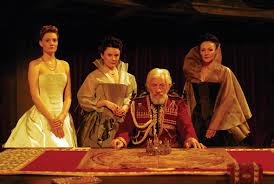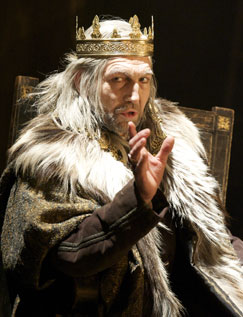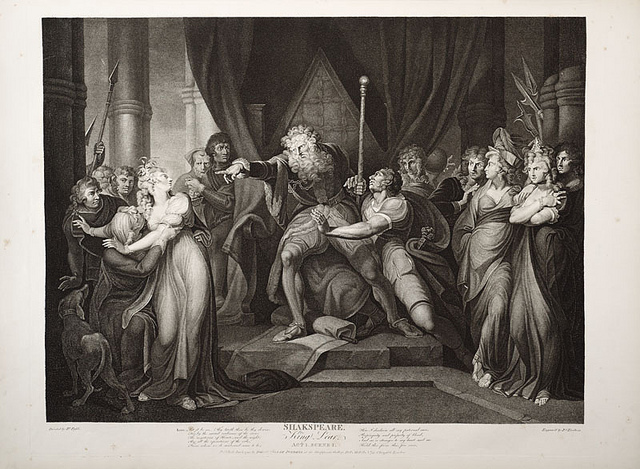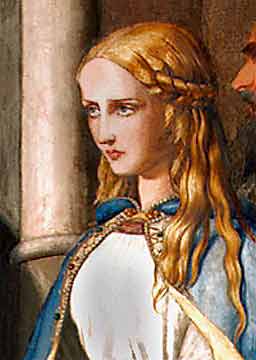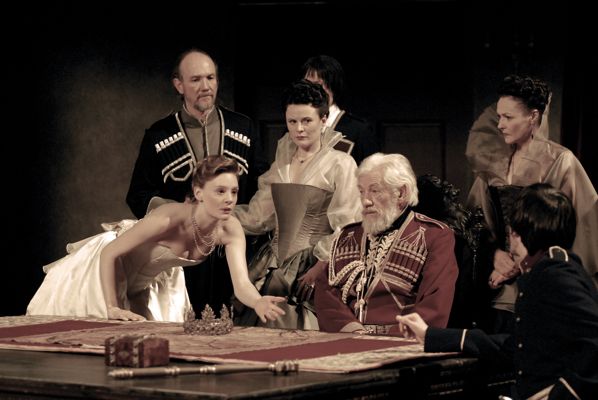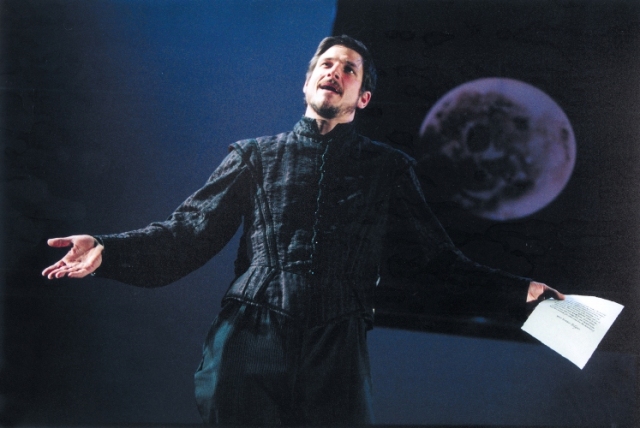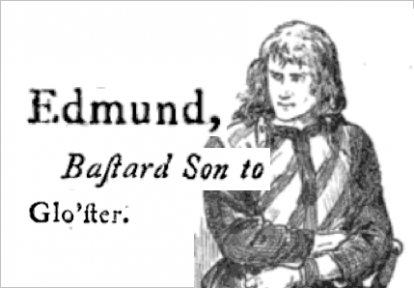Macbeth
Act Four, Part One
By Dennis Abrams
———————–
 Act Four: Desperate for information about the future, Macbeth visits the Witches. He is warned about Macduff but also told that “none of woman born/Shall harm Macbeth.” Hearing that Macduff has escaped to England, Macbeth orders that his wife and children be killed. In England, Malcolm falsely describes himself to Macduff as dissolute and unfit to be King; when Macduff recoils, Malcolm knows him to be loyal to Scotland. The two men are discussing the campaign against Macbeth when news arrives that Macduff’s entire family has been brutally slaughtered.
Act Four: Desperate for information about the future, Macbeth visits the Witches. He is warned about Macduff but also told that “none of woman born/Shall harm Macbeth.” Hearing that Macduff has escaped to England, Macbeth orders that his wife and children be killed. In England, Malcolm falsely describes himself to Macduff as dissolute and unfit to be King; when Macduff recoils, Malcolm knows him to be loyal to Scotland. The two men are discussing the campaign against Macbeth when news arrives that Macduff’s entire family has been brutally slaughtered.
Baffled and panicked by Banquo’s ghost, Macbeth heads out once again to the Sisters – this time in search of answers. What the finds there though, instead of the appealing certainties of before, is a series of dark riddles. Though “none of woman born/Shall harm Macbeth,” the Witches chant, Macduff is still a threat; though Macbeth has nothing to fear until “Great Birnam Wood to high Dunsinane Hill…come against him,’ the last vision he sees depicts a sequence of Banquo’s descendants stretching out ‘to th’ crack of doom,’ as Macbeth shouts out. From these mixed assurances, as equivocal as anything else in this most equivocal of plays, Macbeth manages to construct for himself a kind of comfort – after all, if you can’t conceive of your forest rising up against you, what do you have to be worried about? What is a talisman protecting you against anyone “of woman born” if not a guarantee of immortality? What the Witches offer Macbeth is the certainty that his mind is the only limit: he only need imagine it to be true.
But unfortunately for Macbeth, his brain is, as he tells his wife, “full of scorpions”….
———————————————–
From Van Doren:
 Meanwhile, however, another element has gone awry, and it is one so fundamental to man’s experience that Shakespeare has given it a central position among those symbols which express the disintegration of the hero’s world. Time is out of joint, inoperative, dissolved. ‘The time has been,’ says Macbeth, when he could fear; and ‘the time has been,’ that when the brains were out a man could die, and there an end. The repetition reveals that Macbeth is haunted by a sense that time has slipped its grooves; it flows wild and formless through his world, and is the deep cause of all the anomalies that terrify him. Certain of those anomalies are local or specific: the bell that rings on the night of the murder, the knocking at the gate, the flight of Macduff into England at the very moment Macbeth plans his death, and the disclosure that Macduff was from his mother’s womb untimely ripp’d. Many things happen too soon, so that tidings are like serpents that strike without warning. ‘The King comes here tonight,’ says a messenger, and Lady Macbeth is startled out of all composure: ‘Thou ‘rt mad to say it!’ But other anomalies are general, and these are the worst. The words of Banquo to the witches:
Meanwhile, however, another element has gone awry, and it is one so fundamental to man’s experience that Shakespeare has given it a central position among those symbols which express the disintegration of the hero’s world. Time is out of joint, inoperative, dissolved. ‘The time has been,’ says Macbeth, when he could fear; and ‘the time has been,’ that when the brains were out a man could die, and there an end. The repetition reveals that Macbeth is haunted by a sense that time has slipped its grooves; it flows wild and formless through his world, and is the deep cause of all the anomalies that terrify him. Certain of those anomalies are local or specific: the bell that rings on the night of the murder, the knocking at the gate, the flight of Macduff into England at the very moment Macbeth plans his death, and the disclosure that Macduff was from his mother’s womb untimely ripp’d. Many things happen too soon, so that tidings are like serpents that strike without warning. ‘The King comes here tonight,’ says a messenger, and Lady Macbeth is startled out of all composure: ‘Thou ‘rt mad to say it!’ But other anomalies are general, and these are the worst. The words of Banquo to the witches:
If you can look into the seeds of time,
And say which grain will grow and which will not,
plant early in the play a conception of time as something which fulfills itself by growing – and which, the season being wrong, can swell to monstrous shape. Or it can have no growth at all; it can rot and fester in its place, and die. The conception wavers, like the courage of Macbeth, but it will not away. Duncan welcomes Macbeth to Forres with the words:
I have begun to plan thee, and will labour
To make thee full of growing.
But Macbeth, like time itself, will burgeon beyond bounds. ‘Nature’s germens’ will
tumble all together,
Even till destruction sicken.
When Lady Macbeth, greeting her husband, says with excited assurance:
Thy letters have transported me beyond
This ignorant present, and I feel now
The future in the instant,
she cannot suspect, nor can he, how sadly the relation between present and future will maintain itself. If the present is the womb or seed-bed of the future, if time is a succession of growths each one of which lives cleanly and freely after the death of the one before it, then what is to prevail wills scarcely be recognizable as time. The seed will not grow; the future will not be born out of the present; the plant will not disentangle itself from its bed, but will stick there in still birth.
Thou sure and firm set earth,
Hear not my steps, which way they walk, for fear
Thy very stones prate of my whereabout,
And take the present horror from the time,
Which now suits with it,
prays Macbeth on the eve of Duncan’s death. But time and horror will not suit so nearly through the nights to come; the present moment will look like all eternity, and horror will be smeared on every hour. Macbeth’s speech when he comes back from viewing Duncan’s body may have been rehearsed and is certainly delivered for effect; yet he best knows what the terms signify:
Had I but died an hour before this chance,
I had liv’d a blessed time; for, from this instant,
There’s nothing serious in mortality.
He has a premonition even now of time’s disorders; of his own premature descent into the sear, the yellow leaf; of his failure like any other man to
pay his breath
To time and mortal custom.
‘What, will the line stretch out to the crack of doom?’ he cries when Banquo’s eight sons appear to him in the witches’ cavern. Time makes sense no longer; its proportions are strange, its content meaningless. For Lady Macbeth ins her mind’s disease the minutes have ceased to march in their true file and order; her sleep-walking soliloquy recapitulates the play, but there is no temporal design among the fragments of the past – the blood, the body of Duncan, the fears of her husband, the ghost of Banquo, the slaughter of Lady Macduff, the ringing of the bell, and again the blood – which float detached from one another in her memory. And for Macbeth time has become
A tale
Told by an idiot, full of sound and fury,
Signifying nothing.
Death is dusty, and the future is a limitless desert of tomorrows. His reception of the news that Lady Macbeth has died is like nothing else of a similar sort in Shakespeare. When Northumberland was told of Hotspur’s death he asked his grief to wait upon his revenge:
For this I shall have time enough to mourn.
(Henry IV, 2-1, 136)
And when Brutus was told of Portia’s death he knew how to play the stoic:
With meditating that she must die once,
I have the patience to endure it now.
But Macbeth, drugged beyond feeling, supped full with horrors, and tired of nothing so much as of coincidence in calamity, can only say in a voice devoid of tone:
She should have died hereafter;
There would have been a time for such a word.
There would, that it, if there were such a thing as time. Then such words as ‘died’ and ‘hereafter’ would have their meaning. Not now, however, for time itself has died.”
———————————
From G. Wilson Knight:
 “I have indicated something of the imaginative atmosphere of this play. It is a world shaken by ‘fears and scruples.’ It is a world where ‘nothing is but what is not.’ I have emphasized two complementary elements: (i) the doubts, uncertainties, irrationalities; (ii) the horrors, the dark, the abnormalities. These two elements repel respectively the intellect and the heart of man. And, since the contemplating mind is then powerfully unified in its immediate antagonism, our reaction holds the positive and tense fear that succeeds nightmare, wherein there is an experience of something at once insubstantial and unreal to the understanding and appallingly horrible to the feelings: this is the evil of Macbeth. In this equal repulsion of the dual attributes of the mind a state of singleness and harmony is induced in the recipient, and it is in respect of this that Macbeth forces us to a consciousness more exquisitely unified and sensitive than any of the great tragedies but its polar opposite, Antony and Cleopatra. This is how the Macbeth universe presents to us an experience of pure evil. Now, these two peculiarities of the whole play will be found also in the purely human element. The two main characteristics of Macbeth’s temptation are (i) ignorance of his own motive, and (ii) horror of the deed to which he is being driven. Fear is the primary emotion of the Macbeth universe: fear is at the root of Macbeth’s crime. I shall next notice the nature of those human events, actions, experiences to which the atmosphere of unreality and terror bears intimate relation.
“I have indicated something of the imaginative atmosphere of this play. It is a world shaken by ‘fears and scruples.’ It is a world where ‘nothing is but what is not.’ I have emphasized two complementary elements: (i) the doubts, uncertainties, irrationalities; (ii) the horrors, the dark, the abnormalities. These two elements repel respectively the intellect and the heart of man. And, since the contemplating mind is then powerfully unified in its immediate antagonism, our reaction holds the positive and tense fear that succeeds nightmare, wherein there is an experience of something at once insubstantial and unreal to the understanding and appallingly horrible to the feelings: this is the evil of Macbeth. In this equal repulsion of the dual attributes of the mind a state of singleness and harmony is induced in the recipient, and it is in respect of this that Macbeth forces us to a consciousness more exquisitely unified and sensitive than any of the great tragedies but its polar opposite, Antony and Cleopatra. This is how the Macbeth universe presents to us an experience of pure evil. Now, these two peculiarities of the whole play will be found also in the purely human element. The two main characteristics of Macbeth’s temptation are (i) ignorance of his own motive, and (ii) horror of the deed to which he is being driven. Fear is the primary emotion of the Macbeth universe: fear is at the root of Macbeth’s crime. I shall next notice the nature of those human events, actions, experiences to which the atmosphere of unreality and terror bears intimate relation.
The action of the play turns on a deed of disorder. Following the disorderly rebellion which prologues the action we have Macbeths’ crime, and the disorder which it creates:
Confusion now hath made his masterpiece!
Most sacrilegious murder hath broke ope
The Lord’s anointed temple, and stole thence
The life o’ the building.
Duncan’s murder and its results are felt as events of confusion and disorder, as interruptions of the even tenor of human nature, and are therefore related to the disorder symbols and instances of unnatural behavior in man or animal or element throughout the play. The evil of atmospheric effect interpenetrates the evil of individual persons. It has so firm a grip on this world that it fastens not only on the protagonists, but on subsidiary persons too. This point I shall notice before passing to the themes of Macbeth and his wife.
Many minor persons are definitely related to evil: the two – or three – Murderers, the traitors, Cawdor and Macdonald, the drunken porter, doing duty at the gate of Hell. But the major ones too, who are conceived partly as contrasts to Macbeth and his wife, nevertheless succumb to the evil down-pressing on the Macbeth universe. Banquo is early involved. Returning with Macbeth from a bloody war, he meets the three Weird Sisters. We may imagine that the latter are related to the bloodshed of battle, and that they have waited until after ‘the hurly-burly’s done’ to instigate a continuance of blood-lust in the two generals. We must observe that the two generals’ feats of arms are described as acts of unprecedented ferocity:
Except they meant to bathe in reeking wounds,
Or memorize another Golgotha,
I cannot tell.
This campaign strikes amaze into men. War is here a thing of blood, not romance. Ross addresses Macbeth:
Nothing afeard of what thyself didst make,
Strange images of death.
Macbeth’s sword ‘smoked with bloody execution.’ The emphasis is important. The late wine of blood-destruction focuses the inward eyes of these two to the reality of the sisters of blood and evil, and they in turn urge Macbeth to add to those ‘strange images of death’ the ‘great doom’s image’ of a murdered and sainted king. This knowledge of evil implicit in his meeting with the three Weird Sisters Banquo keeps to himself, and it is a bond of evil between him and Macbeth. It is this that troubles him on the night of the murder, planting a nightmare of unrest in his mind: ‘the cursed thoughts that nature gives way to in repose.’ He feels the typical Macbeth guilt: ‘a heavy summons likes like lead’ upon him. He is enmeshed in Macbeth’s horror, and, after the coronation, keeps the guilty secret, and lays to his heart a guilty hope. Banquo is thus involved. So also is Macduff. His cruel desertion of his family is emphasized:
Lady Macduff:
His flight was madness; when our actions do not,
Our fears do make us traitors.
Ross:
You know not
Whether it was his wisdom or his fear.
Lady Macduff:
Wisdom! to leave his wife, to leave his babes,
His mansion and his titles in a place
From whence himself does flee?
 For this, or from some nameless reason, Macduff knows he bears some responsibility for his dear ones’ death:
For this, or from some nameless reason, Macduff knows he bears some responsibility for his dear ones’ death:
Sinful Macduff,
They were all struck for thee! Naught that I am,
Not for their own demerits, but for mine,
Fell slaughter on their souls. Heaven rest them now!
All the persons seem to share some guilt of the down-pressing enveloping evil. Even Malcolm is forced to repeat crimes on himself. He catalogs every possible sin, and accuses himself of all. Whatever be his reasons, his doing so yet remains part of the integral humanism of this play. The pressure of evil is not relaxed till the end. Not that the persons are ‘bad characters.’ They are not ‘characters’ at all, in the proper use of the word. They are but vaguely individualized, and more remarkable for similarity than difference. All the persons are primarily just this: men paralyzed by fear and a sense of evil and in outside themselves. They lack will-power: that concept finds no place here. Neither we, nor they, know of what exactly they are guilty: yet they feel guilt.
So, too with Lady Macbeth. She is not merely a woman of strong will: she is a woman possessed – possessed of evil passion. No ‘will-power’ on earth would account for her dread invocation:
Come, you spirits
That tend on mortal thoughts, unsex me here,
And fill me from the crown to the tow, top-full
Of direst cruelty!
This speech, addressed to the ‘murdering ministers’ who ‘in their sightless substances wait on nature’s mischief’ is demonic in intensity and passion. It is inhuman – as though the woman were controlled by an evil something which masters her, mind and soul. It is myserious, fearsome, yet fascinating: like all else here, it is a nightmare thing of pure evil. Whatever it be it leaves her a pure woman, with a woman’s frailty, as soon as ever its horrible work is done. She faints at Macbeth’s description of Duncan’s body. As her husband grows rich in crime, her significance dwindles: she is left shattered, a human wreck who mutters over again in sleep the hideous memories of her former satanic hour of pride. To interpret the figure of Lady Macbeth in terms of ‘ambition’ and ‘will’ is, indeed, a futile commentary. The scope and sweep of her evil passion is tremendous, irresistible, ultimate. She is an embodiment – for one mighty hour – of evil absolute and extreme.
The central human theme – the temptation and crime of Macbeth – is, however, more easy of analysis. The crucial speech runs as follows:
Why do I yield to that suggestion,
Whose horrid image doth unfix my hair,
And make my seated heart knock at my ribs
Against the use of nature? Present fears
Are less than horrible imaginings.
My thought whose murder yet is but fantastical
Shakes so my single state of man that function
Is smother’d in surmise, and nothing is
But what is not.
These lines, spoken when Macbeth first feels the impending evil, expresses again all those elements I have noticed in the mass-effect of the play: questioning doubt, horror, fear of some unknown power; horrible imaginings of the supernatural and ‘fantastical;’ an abysm of unreality; disorder on the plane of physical life. This speech is a microcosm of the Macbeth vision: it contains the germ of the whole. Like a stone in a pond, this original immediate experience of Macbeth sends ripples of itself expanding over the whole play. This is the moment of the birth of evil in Macbeth – he may have had ambitious thoughts before, may even have intended the murder, but now for the first time he feels its oncoming reality. This is the mental experience which he projects into action, thereby plunging his land, too, in fear, horror, darkness, and disorder. In this speech we have a swift interpenetration of idea with idea, from fear and disorder, through sickly imaginings, to abysmal darkness, nothingness. ‘Nothing is but what is not’: that is the text of the play. Reality and unreality change places. We must see that Macbeth, like the whole universe of this play, is paralyzed, mesmerized, as though in a dream. This is not merely ‘ambition’ – it is fear, a nameless fear which yet fixes itself to a horrid image. He is helpless as a man in a nightmare: and this helplessness is integral to the conception – the will-concept is absent. Macbeth may struggle, but he cannot fight: he can no more resist than a rabbit resists a weasel’s teeth fastened in its neck, or a bird the serpent’s transfixing eye. Now this evil in Macbeth propels him to an act absolutely evil. For, though no ethical system is absolute, Macbeth’s crime is as near absolute as may be. It is therefore conceived as absolute. Its dastardly nature is emphasized clearly: Duncan is old, good; he is at once Macbeth’s kinsman, king, and guest; he is to be murdered in sleep. No worse act of evil could well be found. So the evil of which Macbeth is at first aware rapidly entraps him in a mesh of events: it makes a tool of Duncan’s visit, it dominates Lady Macbeth. It is significant that she, like her husband, is influenced by the Weird Sisters and their prophecy. Eventually Macbeth undertakes the murder, as a grim and hideous duty. He cuts a sorry figure at first, but, once embarked on his allegiant enterprise of evil, his grandeur grows. Throughout he is driven by fear – the far that paralyses everyone else urges him to an amazing and mysterious action of blood. This action he repeats, again and again.
By his original murder he isolates himself from humanity. He is lonely, endures the uttermost torture of isolation. Yet still a bond unites him to men: that bond he would ‘cancel and tear to pieces’ – the natural bond of human fellowship and love. He further symbolizes his guilty, pariah soul by murdering Banquo. He fears everyone outside himself but his wife, suspects them. Every act of blood is driven by fear of the horrible disharmony existent between himself and his world. He tries to harmonize the relation by murder. He would let ‘the frame of things disjoint, both the world suffer’ to win back peace. He is living in an unreal world, a fantastic mockery, a ghoulish dream: he strives to make this single nightmare to rule outward things of his nature. He would make all Scotland a nightmare thing of dripping blood. He knows he cannot return, so determines to go o’er. He seeks out the Weird Sisters a second time. Now he welcomes disorder and confusion, would let them range wide over the hearth, since they range unfettered in his own soul:
…though the treasure
Of nature’s germens tumble all together,
Even till destruction sicken; answer me
To what I ask you.
 So he addresses the Weird Sisters. Castles, palaces, and pyramids – let all fall in general confusion, if only Macbeth be satisfied. He is plunging deeper and deeper into unreality, the severance from mankind and all normal forms of life is now abysmal, deep. Now he is shown Apparitions glassing the future. They promise him success in terms of natural law; no man ‘of woman born’ shall hurt him, he shall not be vanquished till Birnam Wood comes against him. He, based firmly in the unreal, yet thinks to build his future on the laws of reality. He forgets that he is trafficking with things of nightmare fantasy, whose truth is falsehood, falsehood truth. That success they promise is unreal as they themselves. So, once having cancelled the bond of reality he has no home: the unreal he understands not, the real condemns him. In neither can he exist. He asks if Banquo’s issue shall reign in Scotland: most horrible thought to him, since, if that be so, it proves that the future takes its natural course irrespective of human acts – that prophecy need not have been interpreted into crime: that he would in truth have been King of Scotland without his own ‘stir.’ Also the very thought of other succeeding and prosperous kings, some of them with ‘twofold balls and treble sceptres’ is a maddening thing to him who is no real king but only monarch of a nightmare realm. The Weird Sisters who were formerly as the three Parcae, or Fates, foretelling Macbeth’s future, now, at this later stage of his story, become the Erinyes, avengers of murder, symbols of the tormented soul. They delude and madden him with their apparitions and ghosts. Yet he does not give away, and raises our admiration at his own undaunted severance from good. He contents for his own individual soul against the universal reality. Nor is his contest unavailing. He is fighting himself free from the nightmare fear of his life. He goes on ‘till destruction sicken’: he actually does ‘go o’er,’ is not lost in the stream of blood he elects to cross. It is true. He wins his battle. He adds crime to crime and emerges at last victorious and fearless:
So he addresses the Weird Sisters. Castles, palaces, and pyramids – let all fall in general confusion, if only Macbeth be satisfied. He is plunging deeper and deeper into unreality, the severance from mankind and all normal forms of life is now abysmal, deep. Now he is shown Apparitions glassing the future. They promise him success in terms of natural law; no man ‘of woman born’ shall hurt him, he shall not be vanquished till Birnam Wood comes against him. He, based firmly in the unreal, yet thinks to build his future on the laws of reality. He forgets that he is trafficking with things of nightmare fantasy, whose truth is falsehood, falsehood truth. That success they promise is unreal as they themselves. So, once having cancelled the bond of reality he has no home: the unreal he understands not, the real condemns him. In neither can he exist. He asks if Banquo’s issue shall reign in Scotland: most horrible thought to him, since, if that be so, it proves that the future takes its natural course irrespective of human acts – that prophecy need not have been interpreted into crime: that he would in truth have been King of Scotland without his own ‘stir.’ Also the very thought of other succeeding and prosperous kings, some of them with ‘twofold balls and treble sceptres’ is a maddening thing to him who is no real king but only monarch of a nightmare realm. The Weird Sisters who were formerly as the three Parcae, or Fates, foretelling Macbeth’s future, now, at this later stage of his story, become the Erinyes, avengers of murder, symbols of the tormented soul. They delude and madden him with their apparitions and ghosts. Yet he does not give away, and raises our admiration at his own undaunted severance from good. He contents for his own individual soul against the universal reality. Nor is his contest unavailing. He is fighting himself free from the nightmare fear of his life. He goes on ‘till destruction sicken’: he actually does ‘go o’er,’ is not lost in the stream of blood he elects to cross. It is true. He wins his battle. He adds crime to crime and emerges at last victorious and fearless:
I have almost forgot the taste of fears:
The time has been, my senses would have cool’d
To hear a night-shriek; and my fell of hair
Would at a dismal treatise rouse and stir
As life were in’t; I have supp’d full with horrors;
Direness, familiar to my slaughterous thoughts,
Cannot once start me.
Again, ‘Hang those that talk of fear!’ he cries, in the ecstasy of courage. He is, at least, ‘broad and general as the casing air.’”
This will appear a strange reversal of the usual commentary; it is, however, true and necessary. Whilst Macbeth lives in conflict with himself there is misery, evil, fear: when, at the end, he and others have openly identified himself with evil, he faces the world fearless: nor does he appear evil any longer. The worst element of his suffering has been that secrecy and hypocrisy so often referred to throughout the play. Dark secrecy and night are in Shakespeare ever the badges of crime. But at the end Macbeth has no need for secrecy. He is no longer ‘cabin’d, cribb’d, confined, bound in to saucy doubts and fears.’ He has won through by excessive crime to a harmonious and honest relation with his surroundings. He has successfully symbolized the disorder of his lonely guilt-stricken soul by creating disorder in the world, and thus restores balance and harmonious contact. The mighty principle of good planted in the nature of things then asserts itself, condemns him openly, brings him peace. Daylight is brought to Macbeth, as to Scotland, by the accusing armies of Malcolm.”
——————————-
So what are you all thinking? About the play? About Macbeth? About the witches and fate? Share with the group!
——————————
https://www.youtube.com/watch?v=v6Ebfe90aeQ
https://www.youtube.com/watch?v=HMbB2PHBXmg
https://www.youtube.com/watch?v=9AkTJtGTu78
https://www.youtube.com/watch?v=JqQWmpW46J8
https://www.youtube.com/watch?v=sfT8Pf8OwYQ
My next post: Tuesday evening/Wednesday morning – Act Four of Macbeth


































